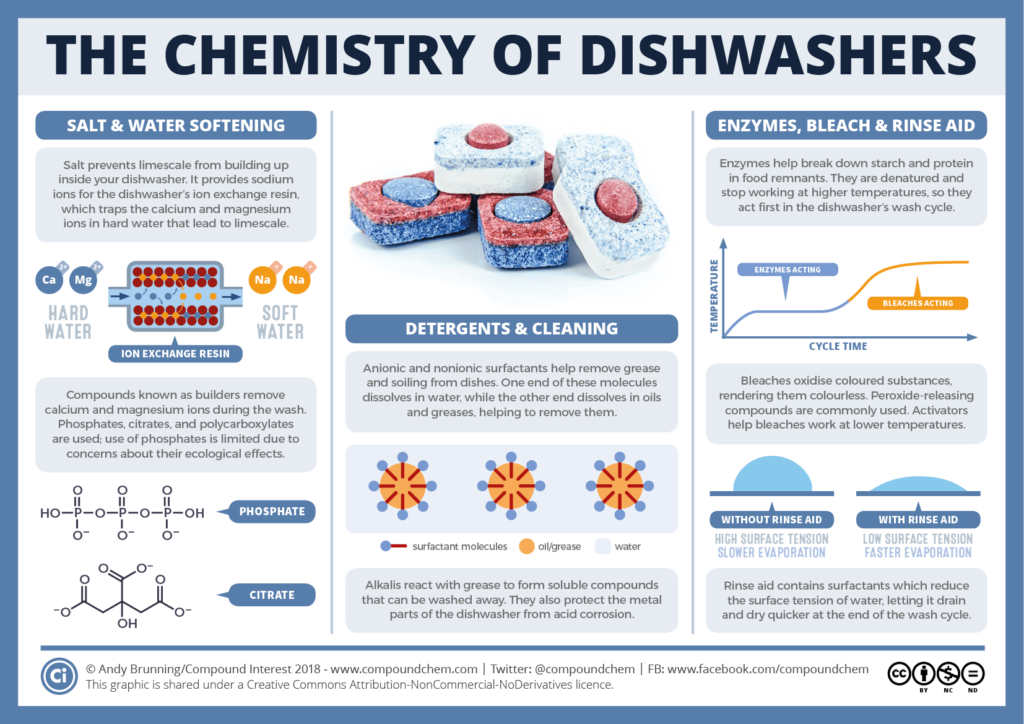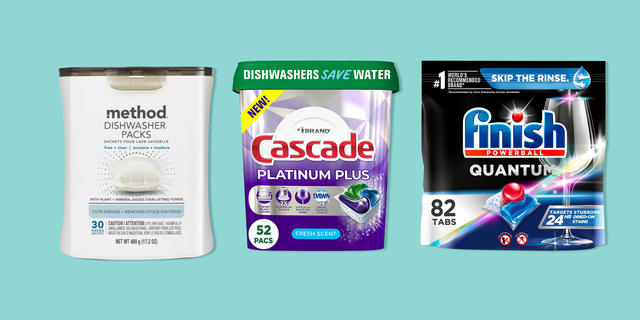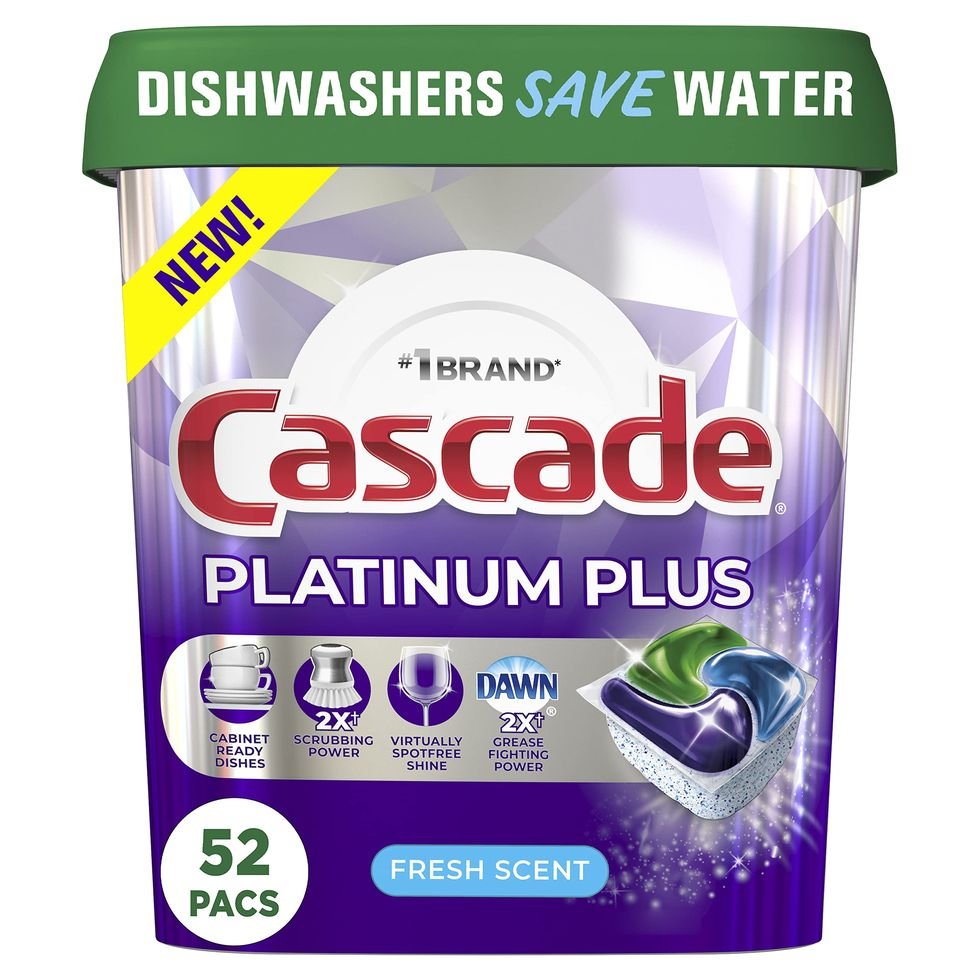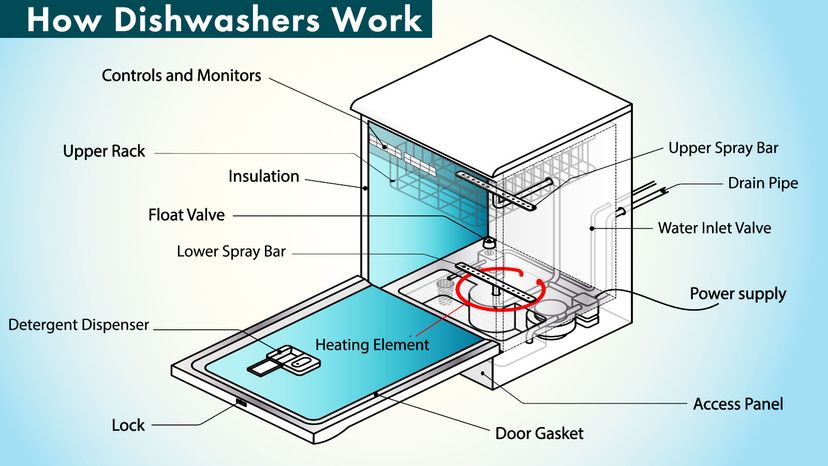
Have you ever wondered how dishwasher detergents actually work their magic? In this article, we will explore the fascinating science behind these cleaning agents. From their unique formulation to the specific ingredients that make them effective, you’ll gain a deeper understanding of how dishwasher detergents tackle stubborn stains and leave your dishes sparkling clean. Get ready to be amazed by the science behind your dishwasher’s secret weapon!
Types of Dishwasher Detergents
When it comes to dishwasher detergents, there are several types available in the market. Each type has its own benefits and considerations. Let’s take a look at some of the common types of dishwasher detergents:
Powder Detergents
Powder detergents have been a popular choice for many years. They are made up of small granules that contain the necessary cleaning agents. One of the advantages of powder detergents is their effectiveness in tackling tough stains and grease. They are also generally more affordable compared to other types of detergents. However, it is important to note that powder detergents may leave residues on dishes if not properly rinsed.
Liquid Detergents
Liquid detergents are another commonly used type of dishwasher detergent. They come in a liquid form and are typically poured directly into the dishwasher dispenser. Liquid detergents are known for their ability to dissolve quickly and effectively, leaving no residue behind. They are also convenient to use as there is no need for measuring or pre-dissolving. However, liquid detergents may be more expensive compared to powder detergents and their packaging often involves the use of plastic.
Pods and Tablets
Pods and tablets are a newer innovation in the world of dishwasher detergents. They are pre-measured, single-use capsules that contain a combination of detergent, rinse aid, and sometimes even a touch of bleach. Pods and tablets are easy to use, as you simply place them in the dishwasher and let them do their job. They are convenient and eliminate the need for measuring or pre-dissolving. However, they can be more expensive compared to other types of detergents, and some users have reported issues with the pods not dissolving completely.
Eco-Friendly Detergents
For those who prefer to use environmentally friendly products, eco-friendly dishwasher detergents are a great option. These detergents are made from plant-based ingredients and do not contain harsh chemicals or phosphates. They are also biodegradable and safer for the environment. Eco-friendly detergents may come in various forms, including powders, liquids, and pods. While these detergents may be more expensive than conventional ones, they are a conscious choice for those who want to reduce their ecological footprint.
Detergent Ingredients
To understand how dishwasher detergents work, it is important to know about the ingredients they contain. Let’s explore some of the key ingredients commonly found in dishwasher detergents:
Surfactants
Surfactants play a crucial role in dishwasher detergents. They are responsible for reducing the surface tension of water, allowing it to penetrate and lift off dirt and food particles from dishes. Surfactants can be divided into three main types: anionic surfactants, non-ionic surfactants, and cationic surfactants. Each type has its own properties and functions, which we will explore in detail later.
Enzymes
Enzymes are natural proteins that help break down and remove different types of stains and food residues. In dishwasher detergents, commonly used enzymes include protease, amylase, and lipase. Protease targets protein-based stains, such as egg or meat, while amylase breaks down starch-based stains, like pasta or rice. Lipase, on the other hand, is effective in removing greasy residues from dishes.
Bleaching Agents
Bleaching agents are included in dishwasher detergents to remove stubborn stains and discolorations. They help to brighten white and light-colored dishes and eliminate any residual odors. Chlorine bleach and oxygen-based bleaches are the two main types of bleaching agents used in dishwasher detergents. Each type has its own advantages and considerations, which we will discuss further in the subsequent sections.
Builders
Builders are ingredients that enhance the cleaning effectiveness of dishwasher detergents. They help to soften water, prevent the deposition of minerals, and improve the overall performance of the detergent. Sodium carbonate, phosphates, and citric acid are commonly used as builders in dishwasher detergents. These ingredients aid in achieving spotless and streak-free dishes.
Anti-filming Agents
Anti-filming agents are additives that prevent the formation of residues or films on dishes after they have been washed. Silicates and polyacrylates are two common types of anti-filming agents used in dishwasher detergents. They work by binding to and removing any remaining food particles, resulting in clean and shiny dishes.

This image is property of i0.wp.com.
Surfactants in Dishwasher Detergents
Definition and Role
Surfactants, short for surface-active agents, are a crucial component of dishwasher detergents. They have the ability to reduce the surface tension of water, allowing it to spread and penetrate more effectively. This, in turn, helps to lift off dirt, grease, and food residues from dishes. Surfactants are one of the primary ingredients responsible for the cleaning power of dishwasher detergents.
Anionic Surfactants
Anionic surfactants are the most commonly used surfactants in dishwasher detergents. They have a negative charge and are effective in removing greasy residues and oils from dishes. Anionic surfactants work by surrounding the dirt particles, breaking them down, and suspending them in water. They are highly effective in cutting through tough stains and grease, resulting in cleaner dishes.
Non-Ionic Surfactants
Non-ionic surfactants are another type of surfactant found in dishwasher detergents. Unlike anionic surfactants, non-ionic surfactants do not carry a charge. They are excellent at removing proteins and starches from dishes. Non-ionic surfactants work by attaching themselves to the dirt particles, causing them to become easier to lift off and wash away. They are particularly effective in removing stains like dried-on sauces or egg residues.
Cationic Surfactants
Cationic surfactants are less commonly used in dishwasher detergents compared to anionic and non-ionic surfactants. They have a positive charge and are primarily used as disinfectants or sanitizers in dishwashers. Cationic surfactants help to eliminate bacteria and other microorganisms, ensuring not only clean but also hygienic dishes.
Enzymes in Dishwasher Detergents
Protease
Protease is an enzyme commonly found in dishwasher detergents. It is responsible for breaking down protein-based stains, such as those from eggs, meat, or dairy products. Protease works by targeting the proteins present in these stains and breaking them down into smaller, more water-soluble components. This allows for easier removal of the stains during the dishwasher cycle, resulting in clean and pristine dishes.
Amylase
Amylase is another enzyme that plays a significant role in dishwasher detergents. It is responsible for breaking down starch-based stains, such as residues from pasta, potatoes, or rice. Amylase works by breaking down the complex chains of starch molecules into simpler sugars that can be easily washed away. This enzymatic action helps to ensure that dishes are thoroughly cleaned, even when dealing with stubborn starchy residues.
Lipase
Lipase is an enzyme essential for tackling greasy residues from dishes. It targets fats and oils, breaking them down into smaller molecules that can be effectively removed during the dishwasher cycle. Lipase is particularly effective in removing greasy stains from dishes, ensuring that they come out spotless and free of any residue.
This image is property of media.hswstatic.com.
Bleaching Agents in Dishwasher Detergents
Chlorine Bleach
Chlorine bleach is a powerful bleaching agent commonly found in dishwasher detergents. It is effective in removing tough stains, whitening white or light-colored dishes, and eliminating any odors. Chlorine bleach works by oxidizing and breaking down the chemical bonds of the stains, making them easier to remove. However, it is important to use chlorine bleach carefully and follow the manufacturer’s instructions, as it can cause discoloration or damage to certain materials.
Oxygen-Based Bleaches
Oxygen-based bleaches, such as hydrogen peroxide or percarbonate, are alternative bleaching agents used in dishwasher detergents. They are considered more environmentally friendly compared to chlorine bleach. Oxygen-based bleaches work by releasing oxygen bubbles that help to break down stains and lift them off the dishes. They are effective in removing stains and whitening dishes without the harshness associated with chlorine bleach.
Builders in Dishwasher Detergents
Sodium Carbonate
Sodium carbonate, also known as soda ash or washing soda, is a common builder used in dishwasher detergents. It serves multiple functions, including water softening, pH adjustment, and enhancing the cleaning power of the detergent. Sodium carbonate helps to soften hard water by binding to the mineral ions present, preventing them from interfering with the detergent’s effectiveness. It also helps to maintain the desired alkaline pH level, optimizing the cleaning process.
Phosphates
Phosphates are another type of builder used in dishwasher detergents. They are effective in softening water and preventing the deposition of minerals on dishes. Phosphates help to enhance the cleaning efficiency of the detergent by binding to the mineral ions, preventing them from interfering with the cleaning process. However, due to environmental concerns, many jurisdictions have imposed restrictions or bans on the use of phosphates in dishwasher detergents.
Citric Acid
Citric acid is a natural builder used in some dishwasher detergents. It acts as a chelating agent, which helps to bind to mineral ions present in the water, preventing them from interfering with the cleaning process. Citric acid also helps to maintain the desired pH level in the dishwasher, ensuring optimal cleaning performance. It is a safe and eco-friendly alternative to phosphates and is often used in eco-friendly dishwasher detergents.

This image is property of hips.hearstapps.com.
Anti-filming Agents in Dishwasher Detergents
Silicates
Silicates are commonly used as anti-filming agents in dishwasher detergents. They work by binding to residual food particles and preventing them from depositing on dishes. Silicates help to ensure that dishes come out of the dishwasher clean and free of any residues or films. They also aid in preventing the formation of scale or mineral deposits on the dishwasher components.
Polyacrylates
Polyacrylates are another type of anti-filming agents used in dishwasher detergents. They function by suspending and dispersing any remaining food particles during the dishwasher cycle, decreasing their potential to leave residues on dishes. Polyacrylates are effective in preventing the formation of films or spots, resulting in sparkling and pristine dishes.
Optical Brighteners in Dishwasher Detergents
Purpose and Mechanism
Optical brighteners are additives used in some dishwasher detergents to enhance the brightness and whiteness of dishes. They work by absorbing invisible ultraviolet light and re-emitting it as visible blue light. This blue light helps to mask any yellow or dull appearance, making white or light-colored dishes appear brighter. Optical brighteners are not cleaning agents themselves but provide a visual enhancement to the appearance of the dishes.
Effectiveness and Safety
Optical brighteners are generally considered safe for use in dishwasher detergents. They do not pose any known health hazards when used as directed. However, some individuals may be sensitive or allergic to optical brighteners, experiencing skin irritation or other allergic reactions. It is important to read and follow the instructions provided by the manufacturer and discontinue use if any adverse reactions occur. Additionally, optical brighteners may not be suitable for all materials and fabrics, so it is recommended to check the care labels of your dishes and utensils.

This image is property of hips.hearstapps.com.
pH in Dishwasher Detergents
Importance of pH
The pH level of dishwasher detergents plays a significant role in their cleaning effectiveness. Dishwasher detergents typically have an alkaline pH, ranging from 9 to 12. This alkaline environment helps to break down grease, food residues, and stains more effectively. It also aids in the removal of mineral deposits and scale on dishes and dishwasher components. Maintaining the proper pH level is crucial for achieving optimal cleaning results.
Alkaline Detergents
Alkaline detergents are designed to have a high pH level, usually above 11. They are effective in removing tough and stubborn stains, such as baked-on food or coffee stains. Alkaline detergents work by breaking down proteins, fats, and carbohydrates present in food residues, making them easier to rinse away. It is important to follow the manufacturer’s instructions and guidelines when using alkaline detergents, as they can be caustic and may cause skin irritation if not handled properly.
Low-Temperature Detergents
Low-temperature detergents are formulated to work effectively at lower water temperatures, such as those found in energy-efficient or eco-friendly dishwashers. These detergents typically have a lower alkaline pH compared to traditional detergents. They utilize a combination of enzymes and surfactants to effectively remove stains and food residues. Low-temperature detergents are designed to be gentle on dishes and energy-efficient, while still providing excellent cleaning results.
Water Softeners in Dishwasher Detergents
Calcium and Magnesium ions
Hard water contains high levels of calcium and magnesium ions, which can impede the cleaning effectiveness of dishwasher detergents. These mineral ions can bind to surfactants and other cleaning agents, reducing their ability to remove dirt and stains from dishes. Water softeners are added to dishwasher detergents to counteract the effects of hard water by binding to the calcium and magnesium ions and preventing them from interfering with the cleaning process.
Effects of Hard Water
If dishwasher detergents are not equipped with water softeners, hard water can lead to several issues. First, it may result in the formation of scale or mineral deposits on dishes, glassware, and dishwasher components. These deposits can make dishes appear cloudy or dull and can be difficult to remove. Hard water can also reduce the effectiveness of detergents, resulting in dishes that are not thoroughly cleaned or have streaks or spots. By incorporating water softeners, dishwasher detergents can overcome the challenges associated with hard water, ensuring sparkling and perfectly clean dishes.
In conclusion, dishwasher detergents are a combination of various ingredients that work together to effectively clean and remove stains from dishes. From surfactants to enzymes, bleaching agents to builders, each ingredient plays a specific role in ensuring optimal cleaning performance. Different types of detergents cater to various preferences and needs, whether it be powder detergents, liquid detergents, pods and tablets, or eco-friendly options. Understanding the science and ingredients behind dishwasher detergents can help you make informed choices and achieve the best results for your dishwashing needs. So next time you load up your dishwasher, you can rest assured that the detergent you choose will leave your dishes sparkling clean.

This image is property of www.realsimple.com.


